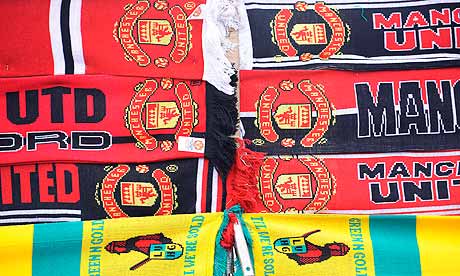
Manchester United today posted record losses of £83.6m despite increased turnover, largely due to interest repayments and one-off financial charges relating to the bond issue that was the catalyst for fierce protests against the Glazers.
The bond issue, billed as a way to restructure United's long-term debt but which also made provision for the owners to take out up to £127m in the first year, resulted in a string of one-off costs that pushed the club to record losses.
The Manchester United chief executive, David Gill, will be able to argue that the club is still growing its revenues and competing at the top level despite calls for boycotts from some fans, as well as a record group-operating profit of £100.8m. But those same fans will point to the figures as proof that their ticket and TV subscription money is going on servicing debt rather than players or facilities.
The club's total debt stood at £521.7m at the end of the year to 30 June, according to the results. The Glazers also owe a further £225m in high-interest PIK loans, which are secured against their shareholding in United and now accrue at 16.25% per annum.
The results show that turnover has increased to a record £286.4m thanks to increased matchday, broadcasting and commercial income. The latter has risen by 16.5% to £81.4m, partly due to the effect of the deals signed with Aon and Nike being felt over a full year and partly as a result of the Glazers' aggressive strategy to grow overseas sponsorship revenues.
Media revenues also increased by 5.1% on the previous year as new broadcasting deals kicked in to £104.8m, but matchday revenues were down 7.9% to £100.2m.
The club said that could be attributed to fewer matches being played at home, and partly as a result of only reaching the quarter-finals of the Champions League as opposed to the final the previous year.
But despite that record turnover – and a £12.7m income from player sales – the club's £40.21m interest bill, a £40.6m charge relating to an interest-rate swap agreement that had to be terminated in order to allow the bond issue to proceed and a £19.2m exchange rate hit all contributed to the £83.6m net loss.
The figures are bound to result in a fresh wave of protests from fans who have vociferously protested against the effects of the debt loaded on to the club by the owners. They say that the Glazers' ongoing ownership is draining the club of finances and leading to increased ticket prices and a lack of investment in the squad.
Gill and the manager Sir Alex Ferguson have continued to insist that money remains available for players and can point to a cash balance of £163.8m in the bank, a figure inflated by the one-off windfall from the £80m transfer of Cristiano Ronaldo to Real Madrid the previous year.
The results boast of a "high level of team performance on the pitch", highlighting a second- place finish in the league and the Carling Cup win, and the signings of Chris Smalling, Bebé and Javier Hernández as evidence of continued investment in the playing squad.
The bond issue, in January this year, laid bare the Glazers' business plan and made provision for the owners to take dividends and one-off payments calculated at up to £127m from the club in its first year, including a one off dividend of £70m.
Today's results show that – as of 30 June 2010 – none of that money had been drawn down. But supporters' groups, including the Manchester United Supporters Trust, say they expect some of that cash to be drawn down to help repay the PIKs sooner rather than later. Their only other substantial business apart from the Tampa Bay Buccaneers – their shopping mall empire in the US – has been hit by the recession.
It emerged last month that the Glazers had bought back around a fifth of the PIK debt at the height of the financial crisis in 2008, so reducing their exposure. But analysts say that does not reduce the impetus to repay them as quickly as possible to prevent the high-interest loans ballooning in value.

